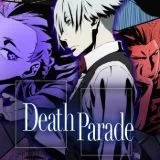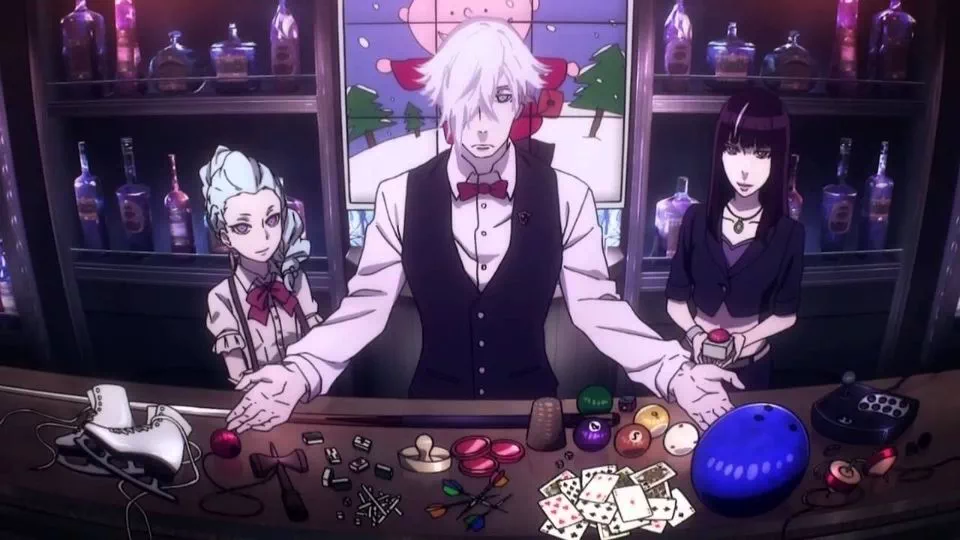Made in Abyss - TV Series R...
Introduction Made in Abyss was produced by K...
By Adonis Monahan4132

0

I’d heard of Death Parade quite a bit before I finally got around to watching it. I’d generally heard that it was a really good show and that it had done especially well online and in fan circles for an original anime.
That specifically caught my attention since most of the anime I've watched had been adapted from other media, and I was interested in watching something that hadn’t been based on a manga or web novel. I hadn’t known this at the time, but Death Parade was also produced by Madhouse, the same studio that’s given us shows like One Punch Man, Death Note, No Game No Life, and many more.
Death Parade was actually based on a short film called Death Billiards, which served as sort of a pilot for the anime’s concept. From there, a full twelve episodes of Death Parade were released, in the winter 2015 season. The anime has a relatively high score of 8.22 out of 10 on MyAnimeList, and it definitely deserves it, if not a much higher score.
Story and Plot
In Death Parade, the afterlife is composed of reincarnation and the void. Based on the judgment of an arbiter, dead humans might be reincarnated in the real world or decompose and sentenced to eternal misery in endless darkness.
The arbiters, unknown creatures that don’t exactly fit the general definition of a god or angel, make this judgment by considering fragments of the humans’ memories and by judging their performance in a deadly game designed to bring out the darkness in their souls.
Games can range from darts to bowling to arcades, and humans dying at the same time may be brought to the arbiter at the same time. The arbiters generally preside over bars, where the games are held and people’s souls are unraveled.
Just the concept alone is enough to hook someone in, and each and every episode of the twelve contains some variant of people entering a bar to be judged. The show primarily focuses on an arbiter named Decim, who judges people entering his bar.
The show does a fantastic job of presenting different deaths and the involvement of the people being judged in their own demise. Each episode presents a unique yet surprisingly ordinary case of humanity. The brilliance of Death Parade’s judgments lies in its presentation of humanity from a non-human lens.
I think that part of the Death Parade’s appeal comes from the intense scenarios that the audience gets exposed to through the judged characters. Intensity does breed an adrenaline rush of a certain form, and the show does certainly get the blood pumping. In the end, it’s up to Decim to decide where the judged souls end up, and there’s not much the audience can do besides silently fume and wonder where they misunderstood the behavior of the characters being judged on screen.
However, this wouldn’t be an anime without some deeper considerations being given to the arbiters themselves. From the second episode onwards, we’re introduced to an unnamed girl (hereafter referred to by her name, Chiyuuki), who, having lost her memory, is assigned to be an assistant to Decim, helping him run the bar and manage his patrons as they arrive.
We watch as Chiyuuki learns the ins and outs of the arbiter’s business, and the show is mainly carried by the momentum of its characters and their deaths and how they were resolved, including Chiyuukis. However, Death Parade also gives consideration to Decim, and the arbiters themselves.
According to the building manager Nona (Quindecim is apparently only one of the hundreds of similar bars), arbiters are simply puppets devoid of human emotion, in order for them to be capable of making objective judgments. Furthermore, part of the arbiter’s job is to manipulate the games the judged souls play to make them more intense.
When a pair plays a bar game, it’s the arbiter’s job to make sure that the game plays out in such a way as to bring out “the darkness” in the souls of its players. Otherwise, it would simply be a meaningless bar game and its results would be of no relevance to the arbiter.
By subtly implying to the amnesiac patients that losing the game would result in their death and making the game more intense by controlling it magically (an extremely soft magic system), the arbiter creates scenarios where the darkest, most desperate facets of a person’s personality are revealed, letting them be judged.
Through the show, we learn that Decim was created with implanted human emotions as an experiment, and together with Chiyuuki, they begin to reject the idea of judging humans in such a cruel way as unfair to them and lacking consideration of the wholeness of their lives.
A lot more machinations occur in the background, with Nona and her co-conspirators rebelling against Oculus, the overseer of the entire arbitration operation, but none of that really goes anywhere. When I neared the end of Death Parade, I felt as though it had the potential to explore the concepts of judgment, bias, and human emotion much more holistically, but most of this never comes to fruition.
Nona and her people sort of fade into the background, and even when the show introduces us to another arbiter named Ginti and how he handles his patrons, it only serves to poke holes in the idea that arbiters are emotionless monsters that judge people without mercy.
To be perfectly honest, Chiyuuki’s story and the individual interactions she has with all of Quindecim’s patrons were more than enough for me. The emotional reward at the end of each episode and at the end of the show was more than satisfying, but I definitely do mourn the loss of a possible, deeper exploration of human nature and the legitimacy of the arbitration concept.
The show leaves us on an almost “lazy” cliffhanger regarding the fate of the arbiters, with Decim promising to change his way of judgment after having gotten to know Chiyuuki, but that’s all, really.
 https://revyou.com/uploads/thumbnail-960/1593232818204img_0116.webp
Death Parade - TV Series Review
https://revyou.com/uploads/thumbnail-960/1593232818204img_0116.webp
Death Parade - TV Series Review
I do want to mention how well the entire universe was designed. Quindecim and the surrounding bars, Nona’s house, the elevator, and the nearby train station all feel perfectly contained; all of it could be packed into an office building somewhere in downtown Tokyo, or the entire operation could be floating in space or somewhere more exotic. The idea of the bar is fantastic, implying the belittlement of human ideas of judgment and divine purpose while returning to address them in a neat circle.
Characters
The introduction of one or two souls destined for judgment at the beginning of each episode gives the idea that the cast is a relatively big one, but the end credits serve a helpful reminder that the cast is actually quite small.
Only nine characters appear in more than one episode, and the vast majority of the action and dialogue is played through by three of them. This is generally a bit of a risky move: if the characters aren’t designed well and turn out unlikable, the audience suffers.
However, Tachikawara Yuzuru, the director and creator of the series, definitely knew what he was doing, because the characters are downright excellent. All the characters felt diverse and worthy of consideration, including the extras.
The main characters, Chiyuuki and Decim, carried the plot well, and the chemistry between them was definitely interesting. The polite, heartless Decim, ever so faithful to his work and patrons, while not being afraid to apologize after making the occasional mistake. Chiyuuki, the slightly short-tempered girl who wears her emotions on her sleeve and isn’t afraid of making her voice heard when she feels like Decim is making a mistake.
The two of them provide interesting, contrasting viewpoints to most of the extras' conflicts during the games, and Chiyuuki’s backstory provides a gut-wrenching look at some of the worst circumstances that can lead to a person’s death. Nona, Ginti, Clavis, and even Occulus, all provide interesting backstory to the bars, and the occasionally required comic relief when the situations get too emotional or difficult for the audience to handle.
These characters were definitely some of the most well-rounded, well-designed characters I’ve seen recently in anime. The nature of the anime certainly helps, since we’re given a lot of dialogue and painful scenarios to see the different sections of the character’s personalities, but that just comes with the territory for an anime like Death Parade.
I also want to add that Decim’s string power is definitely a good touch too. Certainly in a place like a bar for the newly deceased, violence is bound to occur, and giving the person in charge the ability to handle that violence and deal with the perpetrators in short order is excellent.
It was also handled excellently by the director. Never mentioned explicitly, just taken for granted as a tool necessary for the execution of the judgement by the arbiter. Having the power be in the form of strings also gives Decim the impression of being a puppet-master, while the tautness of the strings and the sharp, sliding noises accompanying the strings lend him an image of power and capability. Decim can and does protect both himself and the patrons from themselves, and that’s that.
Music and Art
This is it. This is what turned Death Parade from a very good anime to an excellent one. Both the art and the music are fantastic, and I can’t find more words to express the magnitude of my admiration for both. First of all, art and design are absolutely perfect.
The characters and settings are unique and serve their purpose flawlessly. Just take Quindecim as an example. The bar is composed of a central hall with two round wings on either side of the bar. The entranceway from the elevators where the patrons arrive is long and haunting, and typical, high-class bar décor lines the halls and bathrooms, with various plants and water features.
The amount of detail in the bar itself is stunning, with the mannequins Decim decorates around the bar creating stunning background details, and the various alcoholic drinks behind the bar constantly catching the eye. The color scheme was also excellently done.
The pale skin tones and Chiyuuki and Decim’s black and white hair, respectively, emphasize dichotomy, while the bar’s primary usage of deep purples shows a blend between the two, and richness only emphasized by the high ceilings and soft carpeting. The art, accompanied by the music, lends the entire setting a feeling of danger.
This is where death rests, where judgments are made without any consideration for human feelings, and where people move on, and this is only for this first bar! The other settings, like Nona’s house, are equally mysterious and unique, each one hinting at the existence of a larger, tantalizing universe of judgment and mystical power.
The music, however, is what truly carries through on Death Parade’s promise. The music in Death Parade, which I later found out was composed by Yuki Hayashi, the genius behind the Boku no Hero Academia soundtracks, is the crown jewel of Death Parade -the capstone on the pyramid.
The soundtrack is just the perfect mix of jazzy and melancholy, quizzical and despondent. The pianos and the occasional bass give the entire show a well-deserved feeling of refinement, of a quiet jazz bar late in the evening, with quiet patrons sitting around comfortable tables, speaking in hushed tones of older days, with the bartender quietly polishing a glass and arranging his bottles.
At other times, the music heightens the reaches of emotion generated by the characters we grew so attached to, and the details of the deaths Decim and Chiyuuki try so hard to understand. It’s truly impossible for me to explain just how powerful the effect of this music was on the show; it would definitely not be the same without it.
Conclusion
Death Parade is an excellent piece of original work and some of the best dark drama I’ve seen in recent memory. The character and set designs are on point and the subject matter of each episode is the perfect mix of intensity and individuality, making Death Parade one of the rare anime where each episode is strong enough overall to stand individually. Yet, that doesn’t lessen the importance of the other overarching plotlines.
Despite their issues, Death Parade is truly enjoyable to watch, and when I finished it, it really did motivate me to start questioning some of the bigger issues in life about judgment and the nature of darkness in the human soul.
Death Parade is a journey, and while it is in no way perfect, it is a fantastic venture into the darkness of the human soul, the sorrow one can perceive, and the hope one might find from the wholeness of human emotion.
That, and the music is absolutely insane.
Updated 4 years ago